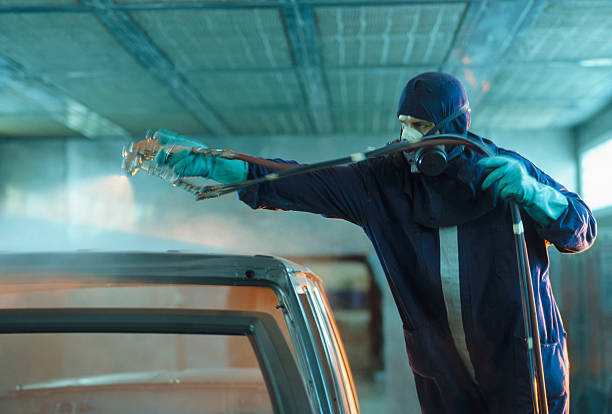How much is a paint job on a car? A car paint job can dramatically enhance your vehicle’s appearance, but understanding the costs involved is crucial for budgeting.
The price of painting a car varies widely based on several factors, including the quality of paint, the size and model of your car, and the extent of preparation work needed.
Whether you’re considering a budget-friendly option or a high-end custom finish, it’s essential to grasp the factors that influence pricing.
This guide will help you navigate the complexities of car paint job costs, offering insights into what affects the price and how to get the best value for your money.
How Much Is a Paint Job on a Car?
A car paint job can significantly improve the look of your vehicle, but the cost can vary greatly depending on several factors.
Whether you’re aiming for a fresh coat to maintain your car’s appearance or considering a complete color change, understanding the components that affect pricing is essential for making an informed decision.
Factors That Affect the Price of Car Painting
1. Paint Quality and Type
The type of paint you choose has a major impact on the overall cost.
Standard acrylic or enamel paints are typically less expensive, while high-end options like metallic or pearlescent finishes come at a premium.
Specialty paints, such as custom colors or those with advanced features like UV protection, can further increase the cost.
Additionally, paint brands and the reputation of the manufacturer can also influence the price.
2. Car Size and Model
The size and model of your car play a crucial role in determining the cost of a paint job.
Larger vehicles, such as SUVs and trucks, require more paint and more labor, which drives up the price.
Similarly, luxury or high-end models may have complex paint jobs that require more precision and care, leading to higher costs.
3. Prep Work and Repairs
Before applying new paint, extensive preparation work is often necessary.
This may include sanding, filling dents, and rust removal. The extent of these preparations affects the final price.
Cars in poor condition may require more intensive prep work, increasing the overall cost of the paint job.
Some shops may include these costs in their quotes, while others might charge separately.
Average Cost Range for Different Paint Jobs
1. Budget Paint Jobs
For those looking for a cost-effective solution, budget paint jobs typically range from $300 to $1,000.
These are often done with lower-quality paint and may involve minimal prep work.
This option is suitable for cars that don’t require a flawless finish and where the primary goal is to refresh the car’s appearance rather than achieve a showroom-quality result.
2. Mid-Range Paint Jobs
Mid-range paint jobs usually cost between $1,000 and $3,000.
This price range typically includes better-quality paint, more thorough preparation, and a more durable finish.
These paint jobs are a good option for those who want a noticeable improvement in their car’s appearance without spending excessively.
3. High-End Paint Jobs
High-end paint jobs can range from $3,000 to $10,000 or more.
These jobs often involve high-quality, custom, or specialty paints and extensive prep work.
The finish is usually flawless, with a level of detail and craftsmanship that provides a showroom-quality appearance.
This option is ideal for car enthusiasts or those looking to make a significant aesthetic change to their vehicle.
DIY vs. Professional Paint Jobs: Cost Comparison
While DIY painting might seem like a way to save money, the results can be less predictable.
DIY kits can cost between $100 and $500, but achieving a professional finish requires significant skill and time.
Poor application can lead to uneven coverage, drips, and a lackluster finish.
On the other hand, professional paint jobs offer guaranteed quality, but come at a higher cost.
Weighing the potential savings against the risk of subpar results is essential when deciding between DIY and professional options.
Additional Costs to Consider
1. Custom Designs and Finishes
Custom designs or unique finishes, such as matte or satin, can add to the cost of a paint job.
These specialized options require additional expertise and materials, which can significantly increase the overall price.
2. Removal of Existing Paint or Rust
If your car has existing paint issues or rust, additional costs may arise for removal and repair.
This extra work is necessary to ensure that the new paint adheres properly and lasts longer, but it can add to the overall expense.
How to Get an Accurate Quote for Your Car Paint Job
To get an accurate quote, provide potential paint shops with detailed information about your car’s condition, the type of paint you desire, and any specific requirements.
It’s also wise to get multiple quotes and compare them, ensuring you understand what each quote includes.
Don’t hesitate to ask questions about the preparation work, paint quality, and any additional costs.
Conclusion
The cost of a car paint job varies widely based on paint quality, car size, and preparation work needed.
From budget options to high-end finishes, understanding these factors helps you choose the best solution for your needs and budget.
While DIY painting can save money, professional jobs offer superior quality and longevity.
To ensure you get the best value, obtain multiple quotes, compare services, and check the reputation of paint shops.
By considering all these elements, you can achieve a refreshed, high-quality finish that enhances your vehicle’s appearance and value.
